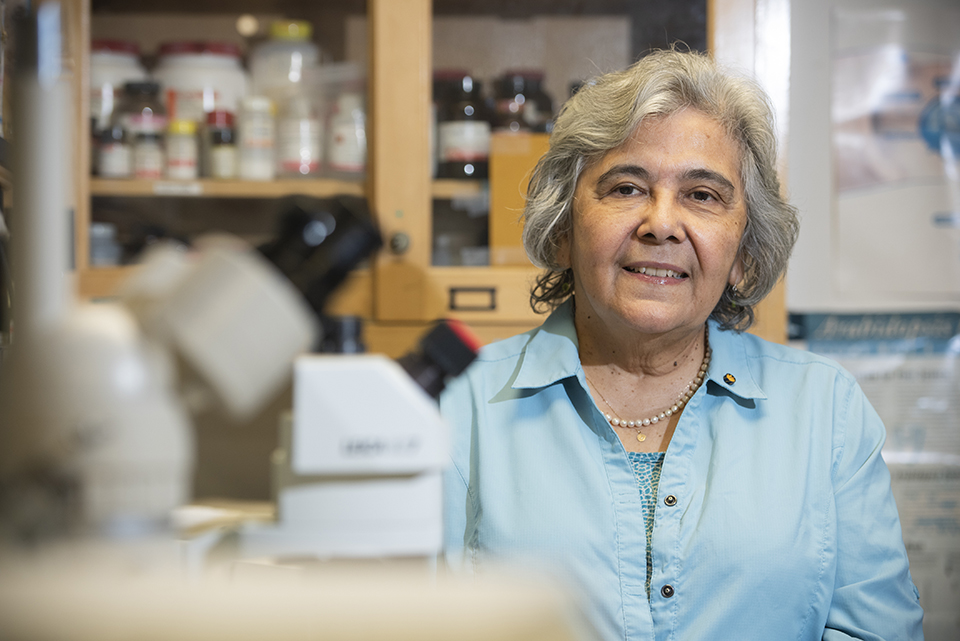CSUN Receives Nearly $3M Grant to Support Students in the Biomedical Sciences

CSUN has been awarded nearly $3 million from the NIH to support students studying the biomedical sciences with an eye on eventually earning a Ph.D. The grant funds a new program, Undergraduate Research Training Initiative for Student Enhancement (U-RISE), of which biology professor MariaElena Zavala (pictured above) is the lead director. Photo by Lee Choo.
California State University, Northridge has been awarded nearly $3 million from the National Institutes of Health (NIH) to support students studying the biomedical sciences with an eye on eventually earning a Ph.D.
The $2,882,538, five-year grant will support a new program, Undergraduate Research Training Initiative for Student Enhancement (U-RISE), designed to equip undergraduate students with skills that will make them more competitive for entry into graduate programs. Targeting students from traditionally underrepresented communities, the grant includes money to cover 60 percent of the students’ tuition to CSUN, as well as stipends and support for their own research projects and attending scientific conferences.
“This is a wonderful opportunity for our students, who are often the first ones in their families to go to college,” said biology professor MariaElena Zavala, lead director of the U-RISE program at CSUN. “In addition to the tuition help, the grant allows us to provide the students with stipends to research and attend conferences — all of which can cement a student’s decision to pursue a career in science.
“When you’re the first in your family to go to college, getting a Ph.D. can seem like a long way off, and the obstacles can seem insurmountable,” she said, who was the first Mexican American woman in the country to earn a Ph.D. in botany. “A program like this demonstrates that there are people out there who believe in you and are willing to support you as you pursue your dream, and that achieving that dream is possible.”
The U-RISE program is administered by the NIH’s National Institute of General Medical Sciences, with the goals of increasing the number of capable, underrepresented scientists engaged in biomedical research, and to strengthening science curricula and research opportunities at institutions with substantial minority enrollment in order to prepare students for careers in biomedical research.
The year-round program replaces CSUN’s Maximizing Access to Research Careers (MARC – undergraduates) and Research Initiative for Scientific Enhancement (RISE – undergraduates and post-graduates) programs, which for more than two decades successfully helped increase the number and capabilities of underrepresented scientists engaged in basic biomedical research.
CSUN’s U-RISE program, led by Zavala and biology professors Cheryl Courtney-Hogue and Ray Hong, starts this summer with an anticipated inaugural cohort of 10 students. In subsequent years, that cohort is expected to increase to 20 students.
In addition to the financial support, the students will receive training on how to be principal investigators (lead researchers) on research projects, be paired with faculty mentors and work on a long-term research project. They also will attend and present at scientific conferences and participate in professional development workshops.
“We want to make sure they have everything they need so that they can hit the ground running when they get into graduate school,” Zavala said.
Zavala also is a co-author of a paper, “Broadening the impact of plant science through innovative and inclusive outreach,” that recently appeared in the journal Plant Direct. The paper provides a guide for increasing science outreach in the field of plant biology.
She and her co-authors are hoping to renew interest in a field of plant biology, which is going to become more and more important as the world grapples with the impact climate change has on global food supplies and medicine.
“When people think about science, they often don’t think about plant science,” said Zavala, who was the first Latino fellow of the American Society of Cell Biology and the American Society of Plant Biologists. “People don’t understand how absolutely important plants are to their well-being. In addition to their aesthetics, plants are at the center of our food chain, and 70-80 percent of all drugs have their origins in plants.”

 experience
experience